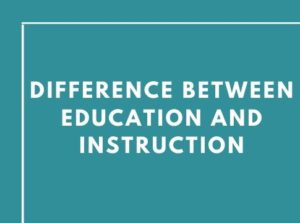The relationship between education and culture can be traced back to the origin of human life on earth. There is a very close rather intimate relationship between culture and education. Both are so independent as neither can develop non implemented without the help of the other.
Both culture and education are so closely related to each other that they both have a common goal to achieve i.e. the improvement or modification of the behavior of an individual. Both culture and education are aimed at making the life of an individual worth living.
Relationship between Education and Culture

- Preservation of culture: Education through its formal and informal agencies play a significant role in preserving all those values, customs, tradition, belief, usage, practice knowledge and experiences, achievements, and non-materialistic sphere which are worthwhile in the present age.
- Transmission of culture: All the agencies of education play an important role in transmitting the culture from one generation to another generation. It is due to the role of education that the thousands of years old culture could be transmitted to the present age to a great extent.
- Promotion or enrichment of culture: Education not only preserves and transmits the old culture to the coming generation in the same form but it also plays an important role in the enrichment or promotion of the culture by adding new experiences, knowledge, inventions, and discoveries in the field of science and technology and other achievement made by society to the culture before transmitting it to the next generation.
- Refinement of the culture: Education also brings refinement to the centuries-old culture by deleting or excluding those customs, traditions, and practices which have either lost their utility or are scientifically discarded.
- Diffusion of Culture: Education plays a significant role in bringing a diffusion among the culture not of different sections of society within the country but also of different countries of the world. Mass media as an informal agency of education is playing an important role in bringing the diffusion of the culture of different countries of the world.
- Removing cultural lag: Education bridges the gap that exists between material and non-material culture through activities and program development.
- Adjustment of culture: Education helps individuals to adapt to the changing culture of society.
- Development of personality: Education aims to develop the personality of the child for this, it employs diverse cultural patterns of thinking, behavior, and items of cultural values so that children are physically, Mentally, Socially, and emotionally developed to the maximum extent
Influence of Culture on Education
Culture influences the following aspects of education
- Aim of education: The meaning and aims of education are determined by the cultural ideas, values, and patterns of society. In short as in the culture of society so shall its aim of education.
- Curriculum: The curriculum is prepared according to the culture of society. The system of education tries to realize the cultural needs of society through the curriculum which conditions all educational activities and programs. There is a waste explosion of knowledge and so the curriculum is keep upgrading to cater to the needs of society.
- Methods of Teaching: Culture and methods of teaching are intimately connected. The changing cultural patterns of society exert their influence on the methods of teaching. Previously teaching was teacher-centric where the teacher used to give knowledge to the child. Now it has become a student center. The teacher considers the instructor only. The cultural and social conditions generate the methods and techniques of teaching in a powerful manner. Different ways of teaching to make teaching more realistic are the new trends in the field of teaching.
- Discipline: Cultural values influence the concepts of the discipline. The present cultural patterns of thinking and living are directly linked to our concept of discipline where democratic values are accepted all over the world.
- Teacher: Each individual teacher is imbibed with the cultural values and ideas of the society of which he/she happens to be an integral member. Only such a teacher achieves his/her mission successfully. They infuse higher ideas and moral values in children.
- Textbook: The curriculum is contained in the textbook. The textbook is written according to the formulated or determined curriculum. Only those textbooks are welcomed which foster and promote cultural values and ideas.
- School: School is the main miniature of society. The total activities and programs of a school are organized according to the cultural ideas and values of the society which establishes and organize the school. Hence, School is the center of promoting, molding, reforming, and developing the cultural patterns of the society
Frequently Asked Questions (FAQs)
What is cultural education?
Cultural education is the teaching and learning process about the customs, traditions, values, beliefs, and practices of a particular culture. The main aim of cultural education is to gain knowledge, understanding, and appreciation of their own culture as well as the other cultures
Why is cultural education important?
Cultural education is very important to develop a broader understanding of culture and the world around them and fosters respect and appreciation for diverse cultures and perspectives. It helps to preserve the culture and transmit it to the next generation. It also helps individuals to break down cultural barriers and promote a more inclusive and understanding society
Who can benefit from cultural education?
Cultural education can benefit anyone who wants to gain a deeper understanding and appreciation of different cultures, including individuals from diverse cultural backgrounds, educators, students, and members of the wider community.
What are some examples of cultural education?
Cultural education examples include cultural exchange programs, community events, arts and music, formal classroom instruction, language classes, etc. Participating in cultural events can learn about the customs, traditions, and beliefs of different cultures.



